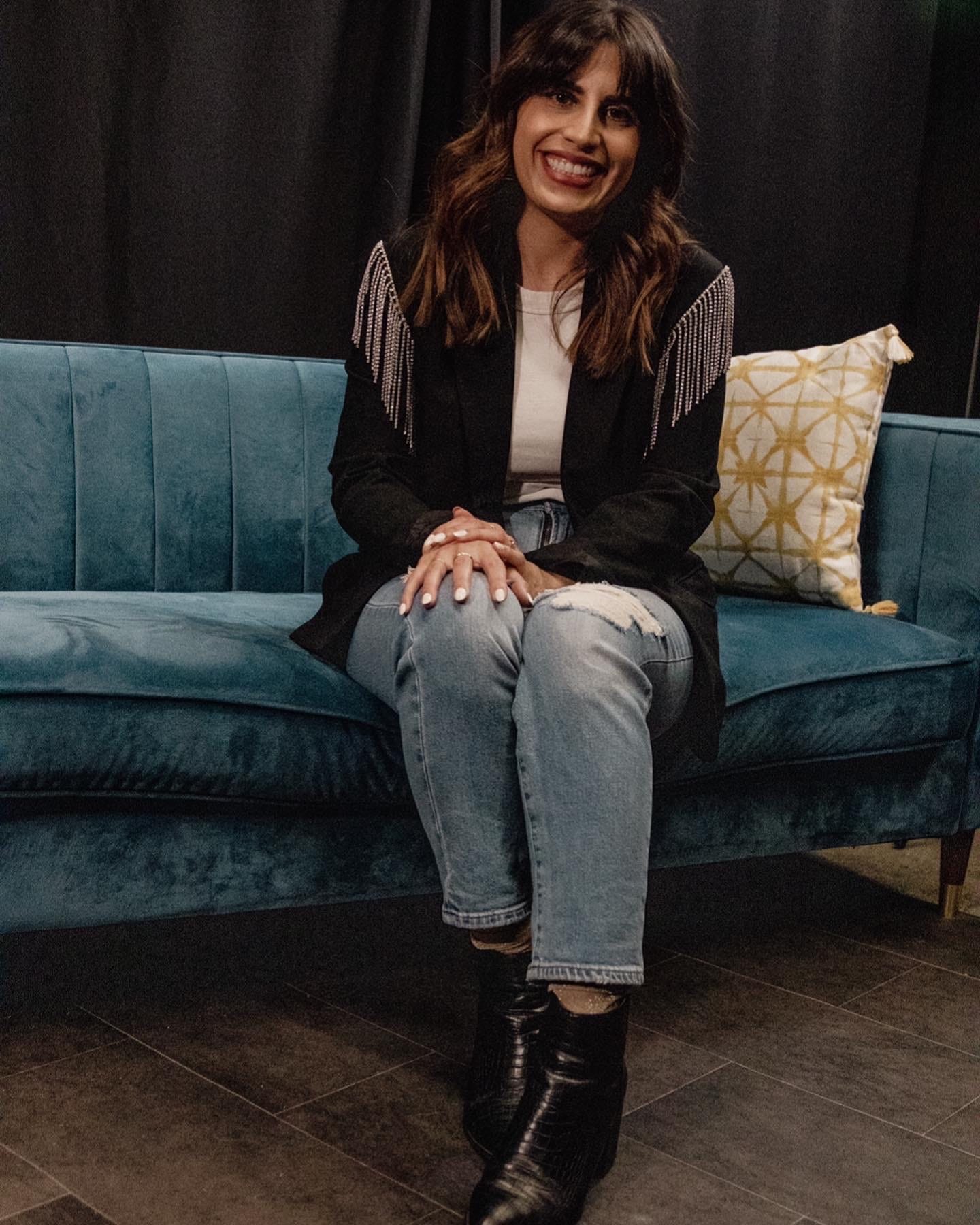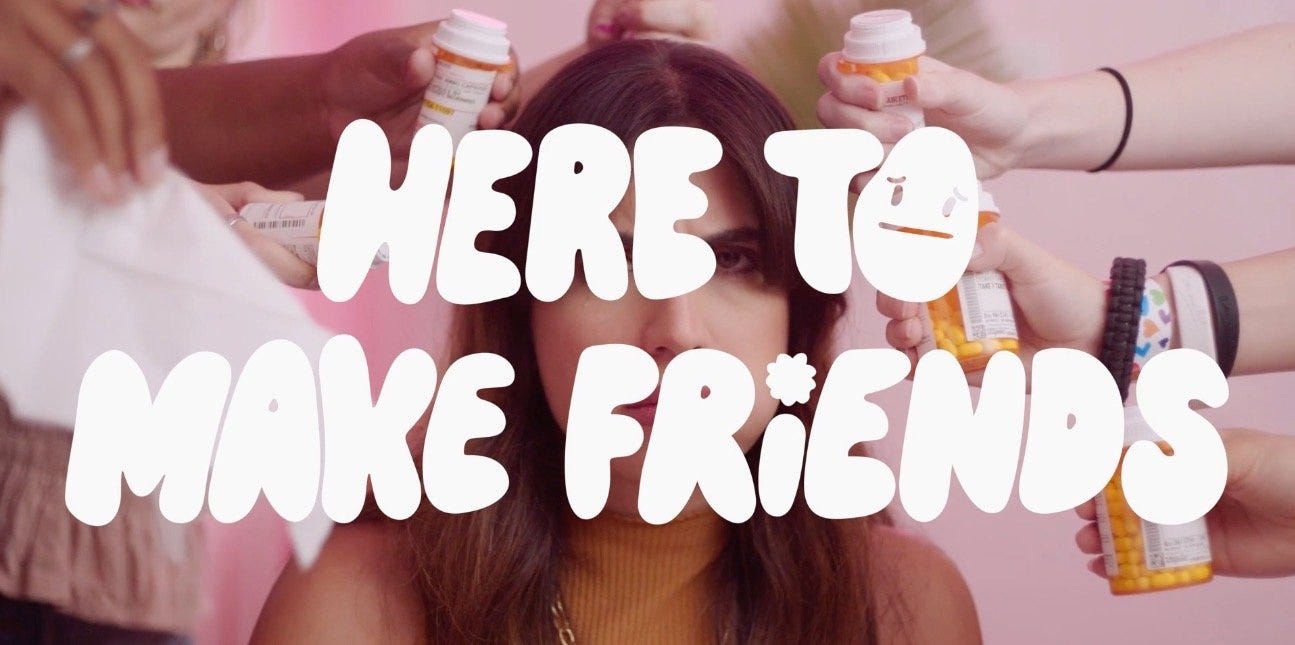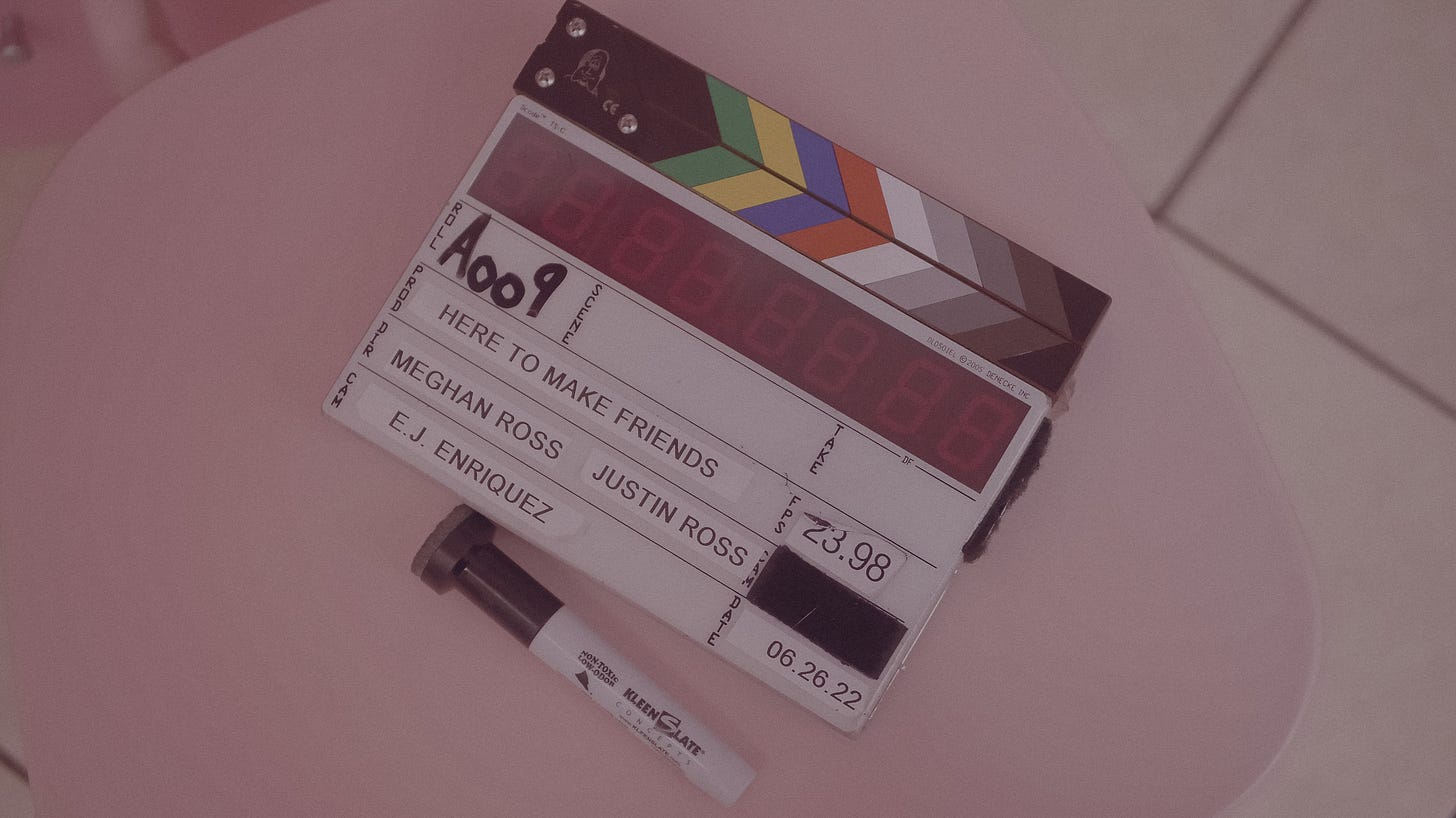We’re still talking about film festivals and the great people we met there. Today I give you Austin-based Meghan Ross — self-proclaimed “manic pixie nightmare feminist” — and her short film, Here To Make Friends. To date, most of the filmmakers featured here are like Ramona (and me)—over 40. Meghan is not. And yet, I really wanted to hear her take on motherhood (a new experience for her) after having made a short about a woman determined to not have kids and the way in which Meghan’s work reflects trends in reproductive justice.
You’ll see. She’s great. Read on.
MR: Growing up, I didn’t think of myself as “a creative.” I was the type-A good student of the family…. I was pursuing the business of entertainment. I thought, let me be the person who crunches the numbers and all the boring stuff while everyone else has fun. But all my internships and extracurriculars were in writing and the student TV station and I interned at Universal Pictures…and my first job out of college was working as a media buyer. But on nights and weekends, I took comedy classes at UCB, which led to doing live comedy in New York.
I love TV and knew I wanted to work in TV and film, and so eventually I learned screenwriting, going from sketch improv, stand up characters, all all those things… even hosting a late-night show in New York, which I brought it down to Austin.
When I got to Austin in 2016, I was working as a producer, for commercials mostly, and learned how to work on set. I knew I wanted to marry the things I learned from my day jobs with the things I was doing outside of that, writing and creating.
I directed my first short in 2018 and fell in love with directing. [To date Meghan has directed six shorts!] I realized I didn't just want to be a writer, I want to be a writer/director. I want to make stuff. I want to be part of the creative process and not just hand it off….
It took me probably halfway through my comedy career to call myself a comedian, and then several years into my film career to actually call myself a filmmaker.
BB: How has having a child changed your identity as an artist, if at all?
MR: It's funny because when I was telling my husband about this interview he said, But you haven't like…balanced both of those.
BB: It’s coming.
MR: It is! And I've talked about it for years now. The feature script that I am currently developing [with co-writer Shruti Saran] The Decision, is about women in their thirties and forties trying to figure out whether or not to pursue parenthood. I wrote it with a friend in my writers group. We knew we wanted to have children but not when or how. Our careers were just starting to get momentum, and we were afraid that motherhood would slow our momentum or that we'd be perceived differently in The Industry.
BB: Oh, that definitely happens.
MR: I always thought: I can't have a baby and a day job. I want to be fully established…or have broken in before I have a kid. But that can be unending. I was in two Sundance programs (including the Episodic Lab with Here To Make Friends) and had still not officially “broken in.” This was also around the time of the impending strike. I was coming up on 34, 35 and I knew I wanted to have kids…so I approached it like: If I let The Industry dictate when I have children, that's as bad as letting the State of Texas dictate when I have children, which they kind of were, because while we were filming Here To Make Friends, Roe v. Wade got overturned and abortion was immediately banned in Texas, although it had pretty much been banned six months prior with the six-week abortion ban. All of that went into my choice to start trying to have a family. [More on the repeal of Roe and how it has affected female-identified creators in our November issue!—BB.]
BB: Are the characters in Here To Make Friends the same as the characters in The Decision? Do we see any crossover?
MR: They're different characters, but I will say the protagonists are pretty similar. The protagonist in Here To Make Friends is in her early to mid-thirties struggling with adult friendships. She doesn't have a family, and she is seeing other people hit milestones or go through changes at a different pace as her. But it's really about her trying to maintain those friendships in adult years. And she's clearly not mature enough to even be thinking about some of those bigger topics because she's sort of self-centered.
With The Decision, our protagonist is in a similar boat—although she really does have healthy, close, female friendships—when her best friend, the last one in their group of friends to not have children, reveals she's pregnant. And so we watch the dynamic between their friendships change and the protagonist having to confront some of her selfishness. We see someone actively making the decision to not have kids—and that’s okay. But we also see her trying to figure out how she fits into the life of her friends who do have kids. And both of my projects are set in Texas. Both acknowledge the reality that this is not a choice that you're able to make for yourself really. [because of anti-choice legislation.]
With The Decision, I’ve had to be patient…it’s a bigger project. We want to see if there are studios brave enough to tackle this subject matter.
BB: What’s your take on the festival circuit? What would you tell other filmmakers?
MR: I really try to tell people to be strategic about it. Categorize your festival goals and create tiers. Tier One would be the “reach festivals”—you know, Sundance, SXSW, Tribeca.
Tier Two would be really great festivals with a 50/50 chance of you getting in. Competitive festivals that are known. And then, Tier Three would be smaller festivals that still target the audience you're trying to reach, especially if your film or the festival is impact-related or related to a social issue that aligns with your distribution strategy. [Like Bentonville whose focus is inclusivity!—BB]
So I guess even before you're making those lists, I tell people to figure out their distribution goals: Who do they want to see this film? Where are those places, in which states?
I was applying to a lot of festivals in red states (in order to have conversations around repro rights). Once you know what your goals are, you can think about what you want out of your festival run. Is it to make connections? Get in front of people who can offer distribution? Is it to find a producer for the next project you're working on? Once you have those goals, then you can determine what festivals make sense.
Ask around before you go to a festival. See how they take care of the filmmakers. Is it about the indie filmmakers? Or is it really about whatever A-listers they can get to premiere at their festival, and indie filmmakers are kind of like…left to the side? [Omaha Film Festival and Florida Film Festival both do a great job with centering indie filmmakers.—BB]
BB: Frankly, I found that whole “clarify your goals” thing really frustrating, because everyone said, Decide whether you want to make money, get the film seen, or get your next job. But in the same breath they also said, You can’t make money, you're not going to make money. They tell us to clarify our goals and then immediately add: Oh, but you can't even have half the things you think you want. So…what are we even talking about?
MR: The current state of the industry does not support or celebrate “indie” projects the way they did in the early to mid 2000s. It's just a different state of the industry. You have to have a name. Even the people with names are struggling to get projects picked up. Mark Duplass is a great example—he's on our creative advisory board at Seed and Spark [Meghan’s day job]. When he was pitching his new project, everyone said no. So if the studios and streamers are saying no to Mark Duplass, and this is in the middle of the pandemic, before the strike, what are they going to say to me, a no-namer?
Duplass is trying to spearhead an independent approach to TV. I think a lot of people realize that we can't depend on the previous methods and avenues for development support or even distribution deals. We were already scrappy. Now we have to be even scrappier and kind of rebuild the ecosystem for indie work to thrive.
BB: Amen. What are you working on now?
MR: I'm currently in post production on a docu-series called How We Grieve, something that my brother and I have been working on the last couple of years about how different cultures and subgroups process grief. While we also use it as an outlet for us to process their own grief with the passing of our aunts, who were in the In Memoriam section in Here To Make Friends credits.
It was interesting because I was pregnant during most of the production, talking to death doulas for that project, while also talking to birth doulas for my pregnancy. I was so fearful because of what was happening in Texas that my own death could come as the choice of someone else.
We're hoping to take it on the festival circuit next year but taking our time. It's the first project that my brother and I are really taking our time on, because with Here To Make Friends we rushed through post, then we kind of slowed ourselves down, but we were always so festival deadline driven. And with How We Grieve, my brother had just had his kid in December. I became pregnant in October of last year, so whether we liked it or not, we were forced to take our time with that project. Plus, I actively wanted to! This was the first nonfiction piece I was working on, and I didn’t want to rush.
And The Decision will be the first feature that I direct. It’s in script form now, awaiting funding.
BB: How can readers watch Here To Make Friends?
MR: Here To Make Friends is just coming out of the festival circuit, and I am hoping to premiere it online this fall, hopefully before the election. I’ll keep you posted.
Talking to Meghan fired me up about reproductive justice, an issue close to my heart, and because of her, I’m devoting an entire issue to it in November. You’ll hear more from my interview with Meghan then along with some super-inspiring people working at the intersection of art and repro rights.
Next week, Hudson Phillips and Jordan Noel of Guacamole Yesterdays. I love these guys, and I think you will too. And then, our Q and A with festival programmers! By October, we’ll be ready to talk about collaboration and circle back with our cast and crew.
In the meantime, let me know what’s landing and what you want to read more about. I aim to please :)
Love, Brooke





“like: If I let The Industry dictate when I have children, that's as bad as letting the State of Texas dictate when I have children” —love this.